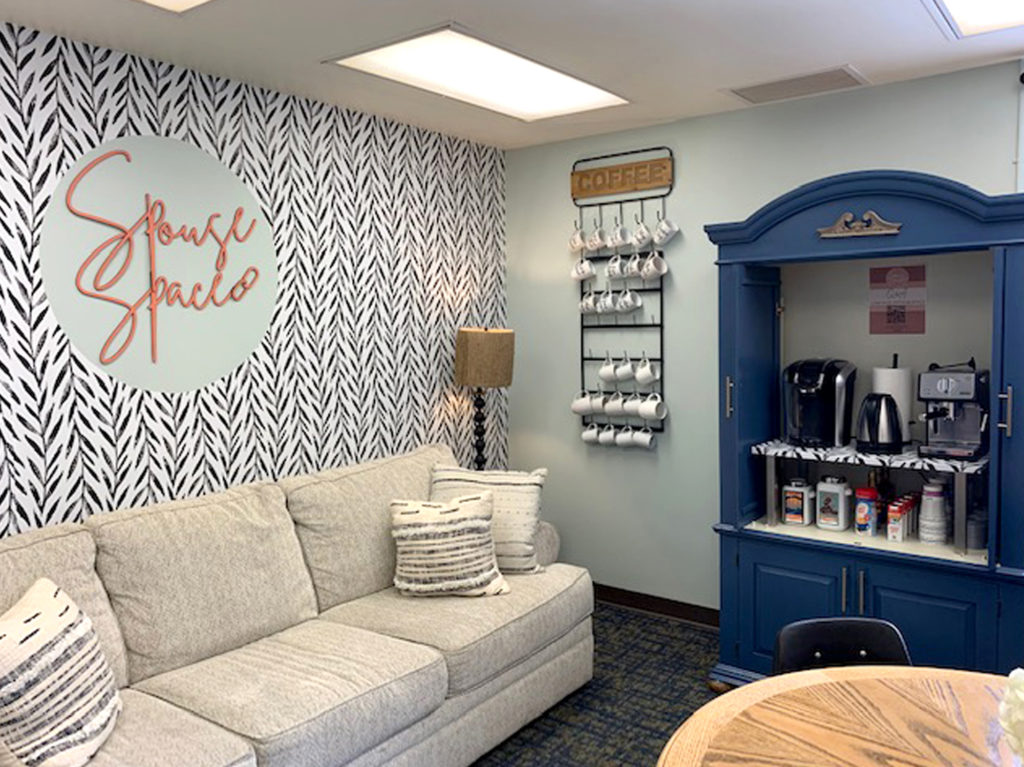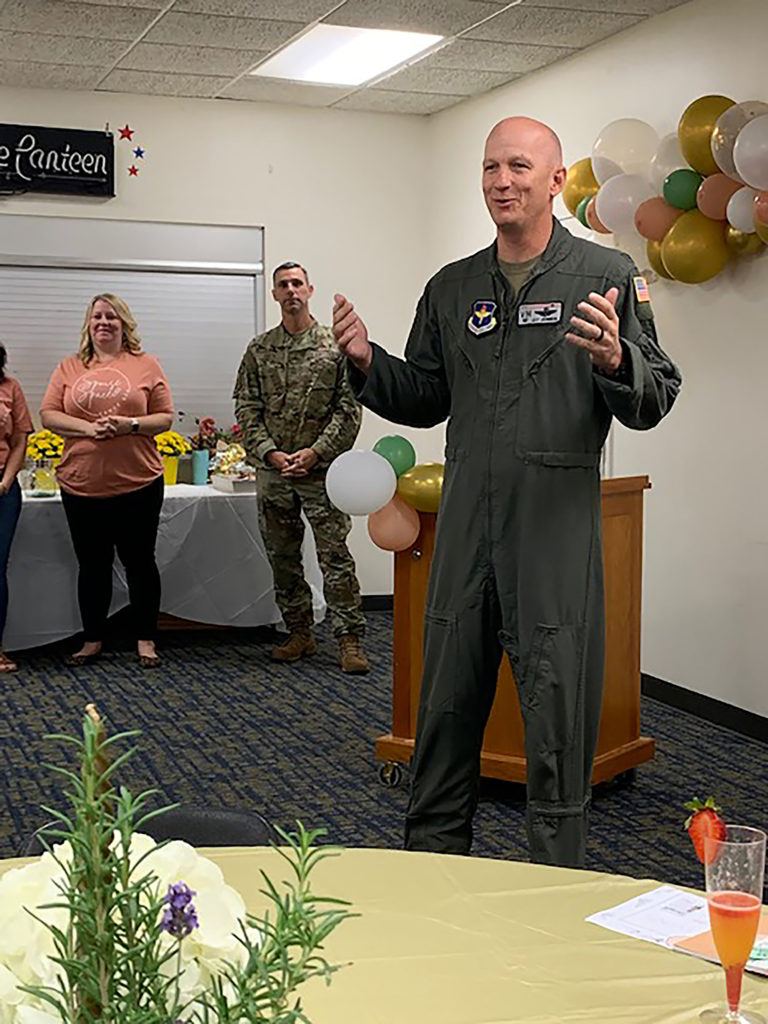The Air Force’s first “Spouse Space” officially opened at Vance Air Force Base, Okla., on Oct. 12 thanks to a group of inspirational spouses, supportive leadership, and strong community support from the Air & Space Forces Association’s Enid Chapter. This project builds a local solution to the quality-of-life issues receiving national attention through [spouse of the 22nd Chief of Staff of the Air Force Gen. Charles Q. Brown Jr.] Sharene Brown’s Five & Thrive initiative.
In a little over a month, Vance spouses mobilized to create the Vance Spouse Space which has a “WeWork”-inspired theme and allows for military spouses to directly connect on base. The initiative will allow spouses to work, study, and connect while increasing spouse resilience and family retention.
“Vance [Air Force Base] is a birthplace of Air Force aviators. As such, we have the opportunity to make a positive first impression on hundreds of Air Force families every year. These first impressions are crucial to resiliency and ultimately retention,” organizer and co-founder of the initiative, Meg Hewes told AFA. “By providing a space for our spouses to work, study, and connect, we hope to show our Air Force spouses that their goals and careers are valued. Moreover, since we know spouse employment is a significant factor in both retention and overall happiness, we hope this space positively impacts Air Force families for years to come.”
A SPOUSE-created space
As you walk into the Vance Spouse Space within the Community Chapel Activities Center, you can’t help but smile. The two rooms are beautiful. Larger furnishings like tables and couches were thrifted and refurbished. Smaller items such as decorations and coffee cups were handmade by local spouse entrepreneurs. Items ranging from coffee machines to snacks to white boards were purchased by community supporters through an Amazon Wish List.
The team behind the Vance Spouse Space is composed of 15 spouses from diverse backgrounds including spouses of officers and enlisted members as well as seasoned and brand-new military spouses. “We believe that spouses hold the answer to many quality-of-life issues. Whether it is spouses starting an initiative like the Spouse Space, raising their hand to support their communities as key spouses, command spouses, or volunteer spouses, so often the solution is a grassroots effort for spouses, by spouses,” co-founder Anne Parker said.
By providing a space for our spouses to work, study and connect, we hope to show [them] that their goals and careers are valued.Meg Hewes, Spouse Space co-founder
The Vance Spouse Space does more than provide a space to work, study, and connect. It addresses the isolation and potential mental health issues that could result from remote work without connection. In a survey Hewes conducted among pilot training spouses at Vance, two-thirds of the spouses worked or studied from home part-time.
“Although the continuity of employment and less underemployment is a significant step forward, … the isolation and loneliness that comes from working alone at home is a common drawback,” Hewes said.
This initiative will not only provide a physical space, it will also enforce the good mental health habits of socialization and community-building. Professional and personal development events are currently planned ranging from book clubs to VA loan seminars. Just as the physical space was created by spouses, the educational content will come primarily from military spouses. Parker summarized, “Our goal with this space is to highlight our military spouses and give them a place to support and help each other. There are so many talents in this community.”
THE MAGIC TRIAD
Although Team Vance made this herculean effort seem easy, a great deal of sweat, heart, and stars aligning helped make this a success. “Community doesn’t just happen. Community is deliberately built,” Parker said at the grand opening. “An initiative like this takes a magic triad. It takes the passion, innovation, and the drive of spouses. It takes the support and connections of our community partners. And finally, the third part of that triad is our leadership.”
The passion Parker speaks of lit up the Enid community. AFA’s Enid Chapter (Okla.) led by Chapter President Geoff Clark jumped right in to support the Vance Spouse Space. The chapter attended planning meetings, solicited donations from local businesses, and is currently working to provide a large-screen TV for videoconferencing. They set a goal of $2,500 for this effort.
Janelle Stafford, AFA National Director for the Central Area, was one of the many AFA leaders who attended the event. “The Enid Chapter has set a high bar for the rest of us to follow and has provided a great template of what can be. A perfect example of community partnerships and how AFA can help meet specific community needs to advance our mission,” Stafford said. “It was such a heartwarming experience.”
Col. Jay Johnson, commander of the 71st Flying Training Wing, noted the community’s support saying, “All the time, this community comes to us and goes, ‘How can we help?’ So, we went out to the community and said, ‘Here’s how you can help.’ This community through the AFA chapter and many others said, ‘What do you need?’ and stepped up to do this. If we had a space that was 10 times bigger, they would have filled it.”
The support of Vance leadership was apparent to every attendee at the Spouse Space launch. Team Vance spouses credit the leadership leg of the magic triad as a critical component of their success. Vance leaders showed up for this initiative every step of the way.
“Capitalizing on the many strengths, talents, and diversity of our spouse force will only strengthen the success of our mission,” said Colonel Johnson in a Vance Air Force Base news release. “Supporting spouses and quality of life for our military families improves the force’s readiness and retention and strengthens the resilience of our families and our communities as a whole.”
“These opportunities empower our spouses to shift their perspective from a feeling of being underutilized and lacking control, to becoming confident as the flexible, resilient powerhouses that we know military spouses to be,” stated Chief Master Sgt. Brandon Smith, Vance’s command chief, in the release.
STRONG FAMILIES, STRONG FORCES
In late 2021, Sharene Brown, launched the Five & Thrive initiative to highlight Quality-of-Life (QoL) issues directly tied to military family readiness, resilience, and retention of the force, which in turn impacts mission execution. Five & Thrive aims to improve the QoL challenges in five focus areas (Child Care, Education, Health Care, Housing, and Spouse Employment) by highlighting preventative measures, promoting best practices, fostering community partnerships, and encouraging Department of the Air Force (DAF) families to thrive.
The Five & Thrive initiative is shaping the conversations of Air Force and Space Force families worldwide. The issues are not new, but the discussions and brainstorming sessions are reinvigorated. Military spouses are coming to the table to be part of the solution. Great people working together on the hard issues will make all the difference.
Committed to supporting the efforts of Sharene Brown and Mollie Raymond, spouse of the first Chief of Space Operations Gen. John “Jay” Raymond, AFA took intentional steps to ensure spouses were part of the Air, Space & Cyber Conference discussions in September. For the first time ever, AFA offered free registration and free memberships to military spouses. Four sessions were dedicated to quality-of-life topics with questions from spouse attendees shaping the discussion. The rooms were packed with spouses, Airmen, and Guardians who all wanted to be part of the solution.
“There is no doubt our spouses make a difference, serving alongside their Airmen and Guardians every day,” said Sharene Brown. “You—our spouses—are often the agents of change,” she said while moderating the “Spouses in the Fight!” panel Sept. 19 at the conference.
The inclusion of spouses at the conference marked a cultural shift. As Air Force spouse Adam Evans summarized, “It previously felt like AFA was a club we didn’t belong to. AFA looked different this year because of the spouses.”
Themes of inclusion and community rang true in countless quality-of-life discussions during the conference. The hard issues cannot be tackled in silos or by individuals. The entire Air Force and Space Force family must come together. As Mollie Raymond reflected on during the “Families in the Fight!” panel, “It’s one thing to just say these programs are out there, the resources out are out there. But when you say and invite spouses to join you, it just brings it to a different level and it says that hey, we can do this together. We can support one another and inspire one another.”
The quality-of-life issues facing the Department of the Air Force are not isolated to spouses. These issues affect our families, resiliency, and retention. An investment in strong families is an investment in stronger Forces.
AMPLIFY THE GOOD
Supporting Department of the Air Force families has been a mission focus for AFA since its inception. The recent efforts by Sharene Brown and Mrs. Mollie Raymond have motivated the organization to persistently provide AFA mission-focused thought leadership and expand and strengthen support for Airmen, Guardians and their families. With a keen desire to avoid reinventing the wheel, AFA is taking a “Listen—Amplify—Connect—Build” approach.
To listen, AFA formed the F2 Task Force promoting Strong Families and Strong Forces earlier this year. This diverse group of 16 spouses provides direct inputs into AFA to include programmatic recommendations and needs-gap analysis.
The largest amplification to date has been the spouse integration during the 2022 Air, Space & Cyber Conference. AFA welcomed 1,000 military spouse registrants to the event. The F2 Task Force is currently exploring other options for virtual events and increased promotion.
With its commitment to DAF families, AFA will build new programming on an as-needed basis where identified. A key focus will be increased support at the local level through community partnerships and AFA chapters. Efforts like the Vance Spouse Space are currently being documented for franchising opportunities at installations around the world.
Just like with the Vance Spouse Space, connection will continue to be a key focus of AFA’s support to military spouses. This has already shown up in the form of spouse networking events and engagements. However, the real magic will happen through AFA’s chapters at the local level. Chapters are led by mission-driven volunteers who believe in our Air Force and Space Force family.
The passion of AFA leaders can be characterized by the quote often attributed to AFA’s founder Gen. James H. Doolittle, “There is nothing stronger than the heart of a volunteer.” When heart and community combine, we will find the right solutions. As Colonel Johnson said with regards to the importance of the Vance community, “You can’t teach [community]. You can’t pay for that. That comes from inside [the heart]. That’s what this space is all about. It’s from the heart and it’s incredible.”
The momentum from the Air, Space & Cyber Conference and the Five & Thrive initiative was cited as a key motivator in the actualization of the Vance Spouse Space. Anne Parker and Meg Hewes took these national efforts and turned them into local action. During the Vance Spouse Space grand opening, Parker ended her remarks with a compelling plea to Vance leadership, “You all believe that our families matter and their quality-of-life is important. You all buy into these efforts and put your backing and credibility behind them. We will build you something that will not just support your families but your mission too.”
For more information on the Thrive & Five initiative, please visit https://www.fiveandthrive.org/home.


